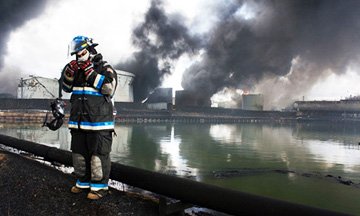Incident Investigation and Root Cause Analysis Training Course
| Date | Format | Duration | Fees | |
|---|---|---|---|---|
| 13 May - 24 May, 2024 | Live Online | 10 Days | $4495 | Register |
| 03 Jun - 07 Jun, 2024 | Live Online | 5 Days | $2250 | Register |
| 17 Jul - 19 Jul, 2024 | Live Online | 3 Days | $1750 | Register |
| 16 Sep - 20 Sep, 2024 | Live Online | 5 Days | $2250 | Register |
| 11 Nov - 15 Nov, 2024 | Live Online | 5 Days | $2250 | Register |
| 25 Dec - 27 Dec, 2024 | Live Online | 3 Days | $1750 | Register |
| Date | Venue | Duration | Fees | |
|---|---|---|---|---|
| 29 Apr - 10 May, 2024 | Barcelona | 10 Days | $9850 | Register |
| 20 May - 24 May, 2024 | Dubai | 5 Days | $4750 | Register |
| 10 Jun - 14 Jun, 2024 | Dubai | 5 Days | $4750 | Register |
| 17 Jun - 21 Jun, 2024 | Singapore | 5 Days | $5695 | Register |
| 08 Jul - 10 Jul, 2024 | Johannesburg | 3 Days | $4100 | Register |
| 29 Jul - 02 Aug, 2024 | Dubai | 5 Days | $4750 | Register |
| 05 Aug - 09 Aug, 2024 | Dubai | 5 Days | $4750 | Register |
| 02 Sep - 06 Sep, 2024 | New York | 5 Days | $5695 | Register |
| 16 Sep - 20 Sep, 2024 | Dubai | 5 Days | $4750 | Register |
| 14 Oct - 18 Oct, 2024 | Dubai | 5 Days | $4750 | Register |
| 04 Nov - 08 Nov, 2024 | Dubai | 5 Days | $4750 | Register |
| 25 Nov - 29 Nov, 2024 | Paris | 5 Days | $5695 | Register |
| 02 Dec - 06 Dec, 2024 | Dubai | 5 Days | $4750 | Register |
| 16 Dec - 18 Dec, 2024 | Houston | 3 Days | $4475 | Register |
Course Overview
Incidents having Health, Safety and Environment (HSE) outcomes or these potential implications are increasingly being seen in all industries globally. Such incidents result not only in serious human injuries but also multiple fatalities resulting from major incidents.
Depending upon the industry, major incidents could be fire, explosion, toxic/lethal releases, collapsing of buildings/ scaffolding, / maritime structures, etc. Depending upon the stakes and risks involved, the concerned industry must pay due attention to such incidents and do everything possible to prevent, minimize and contain the incidents; else quick escalation of incidents beyond the control of an organization can wipe out the assets and end the business of a company.
Incident Investigation and Root Cause Analysis provide an organization with a systematic methodology and actions to minimize/eliminate the incidents which otherwise cause harm to people, damage to equipment or property, loss of production or adverse effect on the environment.
The reported incidents with HSE implications are investigated to find out the root causes of incidents so that corrective and preventive actions can be taken. This enables an organization to minimize/eliminate incidents in future and hence project its good image amongst employees, business world, apart from insurance, legal and regulatory authorities.
This Zoe training course will empower participants with comprehensive knowledge of the need and procedures for handling Incident Investigation and Root Cause Analysis (RCA).
Course Objectives
This important and comprehensive course will equip the participants to:
- Learn fundamentals such as incidents, accidents and near misses
- Understand what Incident reporting is and why it is crucial
- Comprehend good Incident Reporting formats
- Categorize HSE incidents and assess risk categories
- Calculate Incident Frequency and Severity Rates
- Prepare internal and external Incident Reports
- Understand types, methodology and details of investigations
- Gain knowledge of criteria to decide types of investigation
- Understand the composition of investigation teams and responsibilities of members
- Comprehend the guidelines, skills and precautions for the execution of the investigation
- Learn and use Root Cause Analysis (RCA) to arrive at root and generic causes of incidents
- Basic knowledge of the investigation and RCA software tools
- Use the causes to develop Corrective and Preventive Action Plans (CAP & PAP)
- Check the effectiveness of the implementation of CAPs and PAPs
- Understand and practice skills to draft and generate Investigation Report
- Comprehend the importance of incident Close-out
- Cascade lessons learnt from the Incident and the RCA Report
- Understand and address Insurance, Legal and Statutory Implications
Training Methodology
This collaborative Incident Investigation and Root Cause Analysis training program will comprise the following training methods:
- Lectures (Tutor-assisted online or classroom as per requirements)
- Seminars & Presentations
- Group Discussions
- Assignments
- Case Studies & Functional Exercises
Zoe Talent Solutions follows the ‘Do-Review-Learn-Apply’ model.
Organisational Benefits
Companies who nominate their employees to participate in this Incident Investigation and RCA course can benefit in the following ways:
- Minimize adverse impact on business continuity by preventing the incidents through implementation of recommended actions from the investigation report
- Reduce greatly the costs associated with incidents such as insurance premiums, compensation to employees, legal fees and regulatory/statutory penalties
- The culture of Incident Investigation and RCA leaves a positive impact on customers, lenders, insurance underwriters, management system certification agencies, regulatory & statutory authorities, industry and societal spectrum at large
Personal Benefits
Individuals who participate in this Incident Investigation and RCA course can gain from it in the following ways:
- Development of confidence by practising techniques and procedures involving Incident Investigation and RCA, and thus proving to be a successful professional irrespective of their trade
- Since HSE excellence is seen as an important attribute for all professionals of all trades (not only HSE department), this course will help develop a very important aspect in their professional journey which will eventually benefit whichever company they would work for
- An individual develops a safe attitude towards his professional, personal, family and social life with knowledge gained in this training course
Who Should Attend?
This Incident Investigation and RCA course would be suitable for:
- HSE Professionals at all levels (trainees, interns, technicians, officers, managers and others)
- All line functions at all levels (trainees, interns, officers, managers, senior managers in operation, maintenance, inspection, engineering, other line disciplines)
- Middle management and Senior management (a smaller customized part of this course)
- Non-line functions such as office managers
Course Outline
MODULE 1: FUNDAMENTAL CONCEPTS
- Incidents, Accidents and Near Misses
- Occupational Injury and Illness
- Incident Pyramid
- On-work and off-work incidents
- Observer, Local Area Supervisor, Witness
- Company HSE professional
- Company medical practitioner
- How small incidents turn into major incidents?
- Some major incidents in the industry
- Difference between Incident reporting and Incident Investigation report
- Other miscellaneous common refreshing discussions and Q&A to kick off
MODULE 2: INCIDENT REPORTING
- What is Incident reporting? (i.e., notification of occurrence of an incident)
- Incident Reporting procedure (informal and formal)
- Incident Reporting formats
- Categorization of HSE incidents and assessment of risk categories
- Reportable and Recordable Occupational Injury/ Illness
- Fatality (FAT), Permanent Total Disability (PTD), Permanent Partial Disability (PPD), Lost Time Injury/Illness (LTI) Lost Time Incident (LTI)/ Lost Workday Case (LWC)/Lost Time Case (LTC)
- Medical Treatment Case (MTC) and Restricted Work Case (RWC)
- Incident Frequency and Severity Rates
- Preparation of Incident Statistics. Presentation in the Management Information System (MIS)
- Internal and External Incident Reports (notifications)
MODULE 3: CONCEPTS OF INCIDENT INVESTIGATION
- Types of Investigations (Mini, Formal)
- Criteria to decide types of investigation
- Composition of investigation teams
- Ethics, code of conduct, qualities and responsibilities of investigation members
- Preparation for investigation
- Investigation tools (manual, software-based) and methodologies (RCA, fault tree, failure analysis etc)
- Investigation Plan
MODULE 4: EXECUTION OF INVESTIGATION (DATA COLLECTION)
- Briefing by Investigation team leader on scope, limitations and logistics
- Meeting with the affected area supervisor and stakeholders where incident took place
- Site Evidence Collection (photographs, documents etc)
- Witness Interviews
- Consolidation of evidence and statements
- Site discussion/feedback with the affected parties on conclusion of data collection
MODULE 5: EXECUTION OF ROOT CAUSE ANALYSIS (RCA)
- Preparation of the snap-chart /storyline of the whole incident chronologically
- Use of the data collected to brainstorm within team using RCA methodology
- Identification of those items which require further confirmations/data collection from site
- Review of documents, evidence, interview statements etc as RCA progresses
- Roles of Procedures, Training, Quality Control, Communications, Management systems, Human engineering, Work direction
- Carrying out the RCA and saving the work daily/regularly with different file names
- Conclusion of RCA
MODULE 6: PREPARATION OF DRAFT INVESTIGATION REPORT
- Shortlisting/finalizing the information from the site data collection and the RCA
- Importance of a comprehensive Investigation Report
- Finalization of structure of the Investigation Report
- Allocation of responsibilities among team members as to who covers which section
- Generation of Draft Investigation Report within the timeline planned
- Review and approval of Draft Investigation Report by Investigation Team Leader
- Generation of a mini draft investigation report in parallel if client management requires it
MODULE 7: CIRCULATION OF DRAFT INVESTIGATION REPORT
- Decision on whom to circulate the Draft Investigation Report within the organization
- Circulation with a request to send comments within the stipulated time
- Receipt of comments and initial screening
- Seeking clarification on comments, if any
- Emphasis on no-suppression of information by interested stakeholders
- Escalation to area management if someone is interfering to hide sensitive disclosures
MODULE 8: FINALIZATION OF INVESTIGATION REPORT
- Decision on finalization of received comments
- No compromise with integrity of investigation report
- Incorporation of comments
- Recommendation Section must focus on clarification of actions with regards to CAP & PAP
- The final report must bear names and signatures of Team leader and members
- Production of soft and hard copies of final investigation report as per agreement
- Presentation of the report to the client to highlight summary and CAP & PAP
- Answering questions during the presentation
MODULE 9: IMPLEMENTATION OF RECOMMENDATIONS OF INVESTIGATION REPORT
- Review of the report by client area supervisor and management in detail
- Cost benefit analysis for implementation of recommendations
- Development of the plan for implementation of recommendations
- Allocation of resources to implement recommended actions as per HSE risks associated for not implementing them
MODULE 10: FOLLOW UP AND CLOSE-OUT
- Ways to verify effectiveness of implementation of recommendations
- Observations, Interviews, and reviews of subsequent HSE reports of the affected area
- Insurance, Legal and Statutory Implications
- Archive and close-out of the incidents
MODULE 11: CASE STUDIES AND EXERCISES TO DO INCIDENT INVESTIGATION USING RCA
- Course Facilitator runs the above investigation methodology with respect to one incident case study to refresh understanding of the participants
- Course Facilitator presents a few other case studies and asks course participants to work them out with RCA and Investigation Reports
- Course Facilitator observes progress and provides support
MODULE 12: VARIATIONS TO THE ABOVE INVESTIGATION METHODOLOGY AND EXTRAS
- Small organizations
- Low risk organizations
- Any other constraints/assumptions
- Discussions on exceptions/ clarifications on special Injury/Illness cases
- Question and answers











